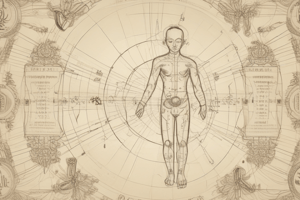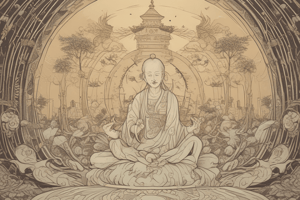Podcast
Questions and Answers
What is the primary goal of acupuncture?
What is the primary goal of acupuncture?
- To diagnose underlying medical conditions
- To stimulate the body's natural healing processes
- To restore balance to the flow of energy in the body (correct)
- To alleviate symptoms of a specific disease
What is the principle behind homeopathy?
What is the principle behind homeopathy?
- The weaker the dose, the better the cure
- The stronger the dose, the better the cure
- Opposites attract
- Like cures like (correct)
What is the main focus of naturopathy?
What is the main focus of naturopathy?
- Performing surgical procedures
- Treating symptoms with pharmaceuticals
- Identifying and treating the underlying causes of illness (correct)
- Using only herbal remedies
What is herbalism primarily used for?
What is herbalism primarily used for?
What is the primary benefit of meditation?
What is the primary benefit of meditation?
What is the primary goal of naturopathy?
What is the primary goal of naturopathy?
What is acupuncture often used to treat?
What is acupuncture often used to treat?
What is herbalism often used in conjunction with?
What is herbalism often used in conjunction with?
What is the underlying philosophy of traditional Chinese medicine?
What is the underlying philosophy of traditional Chinese medicine?
What is the main difference between acupuncture and acupressure?
What is the main difference between acupuncture and acupressure?
Flashcards are hidden until you start studying
Study Notes
Alternative Medicine
Alternative medicine refers to medical practices that are not part of conventional Western medicine. These practices may be used in place of or in conjunction with conventional medical treatment.
Acupuncture
- Originated in China over 2,000 years ago
- Involves inserting thin needles into specific points on the body to stimulate healing and balance
- Believed to restore balance to the flow of energy (qi) in the body
- Used to treat a range of conditions, including pain, migraines, and infertility
Homeopathy
- Developed in Germany in the 18th century
- Based on the principle of "like cures like"
- Uses highly diluted substances to treat symptoms similar to those caused by the substance
- Aimed at stimulating the body's natural healing processes
- Treatments are individualized to each patient
Herbalism
- Involves the use of plants and plant extracts to prevent and treat illnesses
- Herbs can be used in various forms, including teas, tinctures, and capsules
- May be used in conjunction with conventional medicine or as a standalone treatment
- Examples of herbal remedies include echinacea for colds and ginkgo biloba for memory improvement
Naturopathy
- Focuses on natural remedies and the body's inherent healing abilities
- Aims to identify and treat the underlying causes of illness, rather than just symptoms
- May incorporate a range of techniques, including diet and lifestyle changes, herbal remedies, and acupuncture
- Emphasizes prevention and self-care
Meditation
- Involves mindfulness and relaxation techniques to reduce stress and promote well-being
- Can be used to reduce anxiety, improve sleep, and boost mood
- May be practiced individually or in groups
- Can be used in conjunction with conventional medical treatment
Aromatherapy
- Involves the use of essential oils to promote relaxation and well-being
- Oils can be inhaled, applied topically, or used in baths
- Believed to affect mood, reduce stress, and improve sleep
- Examples of essential oils include lavender for relaxation and peppermint for energy
Qi Gong
- A Chinese practice that combines movement, breathing, and meditation to promote balance and harmony
- Aims to cultivate and balance the flow of energy (qi) in the body
- May be used to improve physical and mental well-being, reduce stress, and enhance overall health
Traditional Chinese Medicine (TCM)
- A comprehensive system of medicine that originated in China over 2,000 years ago
- Based on the concept of balance and harmony in the body
- Incorporates a range of techniques, including acupuncture, herbalism, and meditation
- Aims to treat the whole person, not just symptoms
Acupressure
- Similar to acupuncture, but uses pressure instead of needles
- Involves applying pressure to specific points on the body to stimulate healing and balance
- May be used to treat a range of conditions, including pain, migraines, and anxiety
- Can be self-administered or performed by a practitioner
Alternative Medicine
- Alternative medicine refers to medical practices outside conventional Western medicine, used alone or in conjunction with conventional treatment.
Acupuncture
- Originated in China over 2,000 years ago.
- Involves inserting thin needles into specific body points to stimulate healing and balance.
- Believed to restore balance to the flow of energy (qi) in the body.
- Used to treat pain, migraines, infertility, and other conditions.
Homeopathy
- Developed in Germany in the 18th century.
- Based on the principle of "like cures like".
- Uses highly diluted substances to treat symptoms similar to those caused by the substance.
- Aims to stimulate the body's natural healing processes.
- Treatments are individualized to each patient.
Herbalism
- Involves using plants and plant extracts to prevent and treat illnesses.
- Herbs can be used in teas, tinctures, and capsules.
- May be used with conventional medicine or as a standalone treatment.
- Examples: echinacea for colds and ginkgo biloba for memory improvement.
Naturopathy
- Focuses on natural remedies and the body's inherent healing abilities.
- Aims to identify and treat underlying causes of illness, not just symptoms.
- Incorporates diet and lifestyle changes, herbal remedies, and acupuncture.
- Emphasizes prevention and self-care.
Meditation
- Involves mindfulness and relaxation techniques to reduce stress and promote well-being.
- Can reduce anxiety, improve sleep, and boost mood.
- May be practiced individually or in groups.
- Can be used with conventional medical treatment.
Aromatherapy
- Involves using essential oils to promote relaxation and well-being.
- Oils can be inhaled, applied topically, or used in baths.
- Believed to affect mood, reduce stress, and improve sleep.
- Examples: lavender for relaxation and peppermint for energy.
Qi Gong
- A Chinese practice combining movement, breathing, and meditation to promote balance and harmony.
- Aims to cultivate and balance the flow of energy (qi) in the body.
- May improve physical and mental well-being, reduce stress, and enhance overall health.
Traditional Chinese Medicine (TCM)
- A comprehensive system of medicine originating in China over 2,000 years ago.
- Based on the concept of balance and harmony in the body.
- Incorporates acupuncture, herbalism, meditation, and other techniques.
- Aims to treat the whole person, not just symptoms.
Acupressure
- Similar to acupuncture, but uses pressure instead of needles.
- Involves applying pressure to specific body points to stimulate healing and balance.
- May treat pain, migraines, anxiety, and other conditions.
- Can be self-administered or performed by a practitioner.
Studying That Suits You
Use AI to generate personalized quizzes and flashcards to suit your learning preferences.



